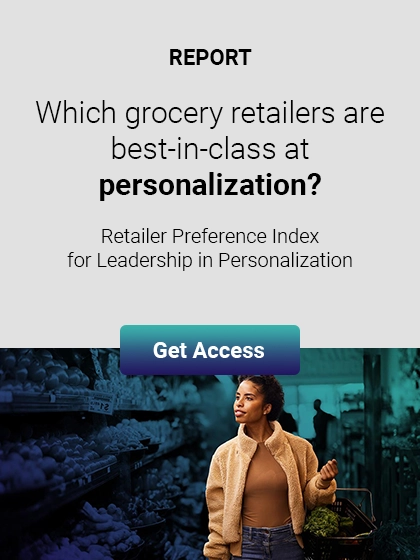How important is quantum computing to the retail industry?
Quantum computing has rapidly become a matter of major importance for technology experts and business leaders alike. What’s responsible for this surge in momentum, and just how quickly do Retail organisations need to start preparing for a quantum future? In the first of a three-part series, dunnhumby Data Scientists Ross Williams and David Hoyle set out to shed more light on the issue.
Like many technologies, quantum computing (QC) is something that goes back much further than we might expect. Just as the origins of the internet stretch back many decades before it entered the wider public consciousness, QC can be traced back to the 1980’s, when the conceptual foundations of the field were conceived.
The exact nature of QC and how it works is something that we explore in the next post in this series. For now, if you’re not familiar with the concept of a quantum computer, there are several things to bear in mind.
Firstly, quantum computers aren’t “better” regular computers – they’re dramatically different systems that excel at solving very specific problems. The reason for that superior performance lies in the fact that these machines utilise some of the strange behaviours demonstrated by quantum particles as part of their information processing capabilities. What this results in is a computer that is almost purpose-built for the express intention of tackling exponentially large mathematical calculations that traditional machines would struggle with.
If you’ve begun to hear more about QC over the past few years – or, indeed, have only just discovered that it exists – you’re not alone. There has been a recent marked increase in interest in QC amongst the tech community and investors. Six years ago private investment into the QC space was essentially non-existent. Today, multiple startups have raised hundreds of millions of dollars of venture capital each. What then, is driving this newfound fixation?
One of the most likely answers is the (relatively) recent launch, and continued growth, of Quantum-as-a-Service (QaaS). QaaS essentially allows commercial entities to “lease” time on a quantum machine, paying for access through the cloud rather than investing in their own dedicated quantum computer. Vendors include Amazon (Braket), Microsoft (Azure Quantum), Google (Quantum Computing Service), and IBM (Quantum Services). The latter of these led the way in the QaaS market, launching the first cloud-based offering in the form of the IBM Quantum Experience in 2016.
With a growing number of big name companies joining the QaaS charge, a virtuous circle is likely to begin building around the market. As QaaS proliferates and becomes easier to access, investment is likely to flood in as a result. Some of that will go to smaller providers and start-ups who can help to improve both the hardware and software that underpins the QaaS market. With performance rising as a result, demand will continue to grow.
That’s what should happen in theory, at least. Real progress in QC will of course depend on its ability to deliver results for the companies that choose to venture into this nascent field.
So when will this day arrive? The honest answer, today at least, is that we’re not entirely sure. While use cases and practical applications for quantum do continue to develop – something we’ll discuss in our next post in this series – we’re still some way away from a world in which the average company can tap into QC and expect to achieve overnight advantage. Retailers shouldn’t be expecting to magically discover a new way of routing their delivery fleet simply by throwing QC at the problem. Not yet, at least.
If quantum isn’t yet at the stage at which commercial companies can easily derive clear value from it, then, just how seriously should we be taking it? The answer, vague though it may be, is that your mileage is likely to vary. As with any emerging technology, there is a risk of buying in too early, only to find that many of the promises made go unfulfilled. On the other hand, given the complex subject matter, first-mover advantage will be particularly strong for QC, and getting ahead of the game can have a transformative effect.
At this stage, the best advice that we can give to any Retailer is to have a clear understanding of the potential of QC. Retailers are no strangers to cutting-edge data science, and the prospect of a platform that can tackle challenging calculations should be immediately appealing. As that virtuous circle that we mentioned earlier continues to gather pace, the odds that some forward-thinking start-up develops a killer QC app for Retail will continue to shrink, too.
Now is the time for Retailers to be in learning and exploration mode, and our report on quantum computing will help you get started. As with any new technology, the focus must be on what it can help you achieve, not how powerful it is. Don’t jump on the bandwagon simply because it’s there; do so because you know exactly where you want it to take you.
If this post sounds at all pessimistic, we’d ask you to substitute that sensation for one that’s a touch closer to realistic. QC is a hugely exciting field, and one that dunnhumby is already exploring in earnest. In the next post in this series, we’ll be looking at some of the ways in which QC could be applied to commercial challenges, and the current “state of the possible”.
This blog discusses themes covered in greater depth in our new report on quantum computing: “Demystifying quantum computing for commercial companies.” Download a complimentary copy of the report here.
The latest insights from our experts around the world
Disaggregating Forecasts
The six drivers of private brand innovation
AI's Regulatory Crossroads: Innovation vs. Control

Speak to a member of our team for more information



